新课标人教版选修六教案Unit 5 The power of nature
Unit-5--The-Power-of-Nature-(单元)教案--(人教版选修6)

Unit 5 The Power of Nature (单元)教案(人教版选修6)Period 1 Warming up and readingTeaching goals:1.To have the students get a general idea of natural disasters.2.To help the students develop speaking ability.3.To improve the students’ reading abilities.4.To help the students to know how to summarize a text or a paragraph.Step1 Warming up1. Ask students to list other natural disasters, such as hurricane,earthquakes, volcano, etc. Show the pictures of these natural disasters.2. Introduction to volcanoVolcano is one of these natural disasters. We should also do something to avoid its eruption or reduce its damage to us.What do you know about volcanoesHow is a volcano formedHow does a volcano erupt3. Discuss about the measures that we should take to avoid natural disasters.We can find how powerful nature is and how weak humans are compared with a volcano, hurricane, earthquake or other natural disasters. But we are not completely powerless. We can take measures to protect ourselves from powerful natural forces. What measures should we takeStep2 Pre-readingIf we can predict the eruption of volcanoes, we can reduce its damage to us. So we need volcanologists to study volcanoes.Do you want to be a volcanologist WhyIf you are a volcanologist, what kind of danger will you meet (what kind of work should you do)Let’s learn something about volcanologists in the text.Step 3 Skimming1. Read through the passage quickly and find out the answers to the questions. What kind of things should a volcanologist doWhat is the volcanologist wearing when getting close to the crater2. Divide the passage into several parts and find out the main idea of each part. Step 4 ScanningScan the passage .Read the passage carefully and answer the following questions.1.Why is a volcanologist’s job important2.Where is Mount Kilauea3.Why is the lava that flows on Mount Kilauea more dangerous than the actualeruption4.What caused the writer’s bedroom to become as bright as day even though it wasnight5.Why did the scientists have to get close to the volcano after it began erupting6.Why was it difficult for the writer to walk towards the edge of the crater7.What does the writer find impressive about volcanoes even after studying themfor 20 yearsStep 5 DiscussionT1 Do you think it is an occupation you would enjoy Discuss your reasons with your classmates.T2 InterviewMake up an interview. Four students as a group. One student acts as the writer of the passage. The other three students act as the journalists from three different TV stations.Step 6 Homework:Spend some time researching one disaster. You can use books, magazines, newspapersor the Internet. Collect pictures and diagram and look for information about:• what causes this kind of disaster• actual events that h appened in the past in china and/or the rest of the world • how people helped the victims• what is being done to prevent the disaster happening again or to lessen the damagePeriod 2 Learning about LanguageTeaching goals:1.To help the students to learn how to use words and expressions.2.To review the V-ing form and learn the perfect V-ing form.Step 1 Discover useful words and expressions1.Show the video of an episode of Vesuvius eruption and ask students to fill in thetext with proper words.The eruption of Mount Vesuvius in 79AD took people in Pompeii by surprise. It was so quick and so severe that the town was soon covered in ________ and ________. Many houses in the town were ________. It was an ________ disaster for many people who could not get away in time. A writer named Pliny, who was there during the _______, described how lava was thrown into the air like a ________. ________ many of the townspeople, ________ at the ________ sight of Vesuvius eruption, stayed too long and failed to escape in time.2.Find suitable words or expressions from the texts in the unit to fill in the blankson page35.Step2 Grammar1.Show a flash to review the differences between V-ing and the past participle.a.现在分词表示主动,过去分词表示被动。
人教版高二英语选修6_Unit_5_The_power_of_nature_全单元教案
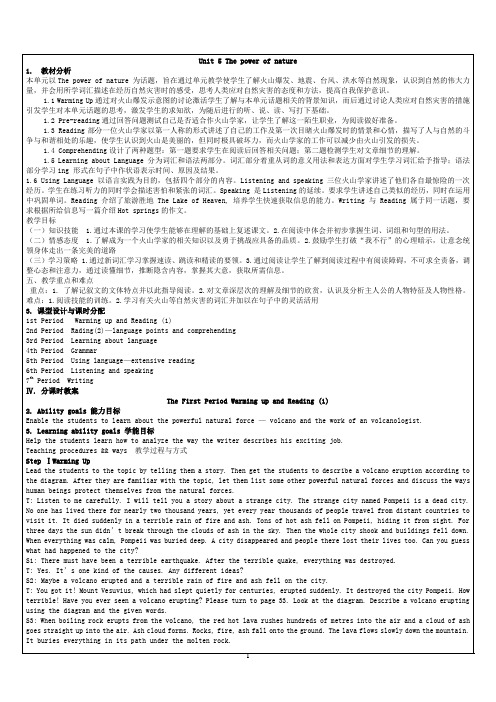
Unit 5 The power of nature1.教材分析本单元以The power of nature 为话题,旨在通过单元教学使学生了解火山爆发、地震、台风、洪水等自然现象,认识到自然的伟大力量,并会用所学词汇描述在经历自然灾害时的感受,思考人类应对自然灾害的态度和方法,提高自我保护意识。
1.1 Warming Up通过对火山爆发示意图的讨论激活学生了解与本单元话题相关的背景知识,而后通过讨论人类应对自然灾害的措施引发学生对本单元话题的思考,激发学生的求知欲,为随后进行的听、说、读、写打下基础。
1.2 Pre-reading通过回答问题测试自己是否适合作火山学家,让学生了解这一陌生职业,为阅读做好准备。
1.3 Reading部分一位火山学家以第一人称的形式讲述了自己的工作及第一次目睹火山爆发时的情景和心情,描写了人与自然的斗争与和谐相处的乐趣,使学生认识到火山是美丽的,但同时极具破坏力,而火山学家的工作可以减少由火山引发的损失。
1.4 Comprehending设计了两种题型:第一题要求学生在阅读后回答相关问题;第二题检测学生对文章细节的理解。
1.5 Learning about Language 分为词汇和语法两部分。
词汇部分着重从词的意义用法和表达方面对学生学习词汇给予指导;语法部分学习ing 形式在句子中作状语表示时间、原因及结果。
1.6 Using Language以语言实践为目的,包括四个部分的内容。
Listening and speaking 三位火山学家讲述了他们各自最惊险的一次经历。
学生在练习听力的同时学会描述害怕和紧张的词汇。
Speaking 是Listening的延续。
要求学生讲述自己类似的经历,同时在运用中巩固单词。
Reading 介绍了旅游胜地 The Lake of Heaven, 培养学生快速获取信息的能力。
Writing 与Reading 属于同一话题,要求根据所给信息写一篇介绍Hot springs的作文。
Thepowerofnature--UsingLanguage教案(新人教版选修6Unit5)

The power of nature--Using Language教案(新人教版选修6 Unit 5)Teaching materialNSEFC Book 6 —— Unit 5Teaching aimsEnable the students to learn some information about The Lake of Heaven.Teaching important& difficult pointHow to help the students to get the information about the reading materials.Teaching aidstape recorder, slidesTeaching proceduresStep1 Warming upT: Have you ever been to some natural sceneries? Now let’s look at some pictures of some sceneries.The Lake of Heaven. Mount Tai jiuzhaigouMount Huang fuxianhu the west lakeStep 2 Fast readingRead the text quickly and find out the key words(关键词)of each paragraph.Paragraph 1 ChangbaishanParagraph 2 TianchiParagraph 3 storiesParagraph 4 coinStep 3 Careful ReadingRead the passage carefully and finish the following tasks. Paragraph 1 ChangbaishanParagraph 2 TianchiParagraph 3 Fill in the blanks with some persons or animals to complete the chart.Three young women bathingfrom heaven a birdflewThe Manchupeopledropped father fruitA handsome gave birth toboy swallowed The youngest girlpregnantParagraph 4 coinYou and your ______ one drop a ____ into the clear, blue water to ________ your love will be as _____ and _______ as the lake. Keys: loved; coin; guarantee; deep; lastingStep 4 Detailed reading1. In what province is Changbaishan?In Jilin Province.What is a nature reserve? Why is Changbaishan a famous nature reserve?A place kept in its natural state for people to enjoy. The largest one in China.What is the most popular tourist attraction in the reserve? Tianchi, or the Lake of Heaven.4. What does Tianchi mean? How is Tianchi formed?The Lake of Heaven. In the crater of a dead volcano.5. What is the connection between the Manchu people and Tianchi? The story of the father of Manchu people.Step 5 DiscussionIf you were a tourist guide(导游), how would you introduce the Lake of Heaven in Changbaishan to the tourists?ChangbaishanTianchistorycoinThe Lake of Heavenin its four seasonsSpring summer autumn winterStep 6 HomeworkSurf the Internet to find more information about the Lake of Heaven.。
高中英语 Unit5《The power of nature》教案(6) 新人教版选修6
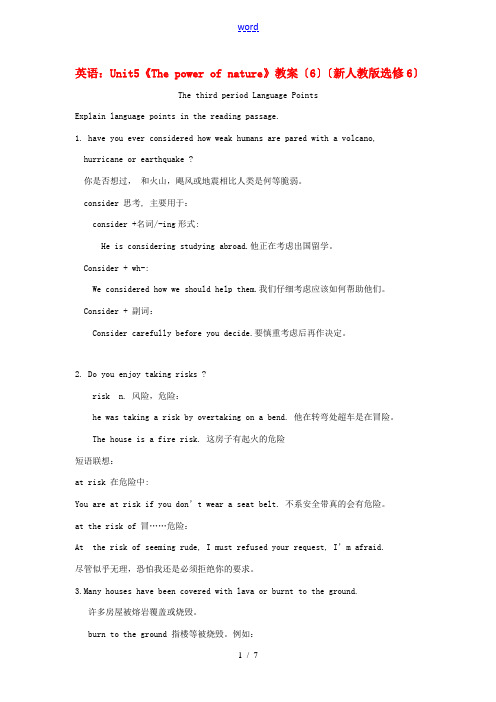
英语:Unit5《The power of nature》教案〔6〕〔新人教版选修6〕The third period Language PointsExplain language points in the reading passage.1. have you ever considered how weak humans are pared with a volcano,hurricane or earthquake ?你是否想过,和火山,飓风或地震相比人类是何等脆弱。
consider 思考, 主要用于:consider +名词/-ing形式:He is considering studying abroad.他正在考虑出国留学。
Consider + wh-:We considered how we should help them.我们仔细考虑应该如何帮助他们。
Consider + 副词:Consider carefully before you decide.要慎重考虑后再作决定。
2. Do you enjoy taking risks ?risk n. 风险,危险:he was taking a risk by overtaking on a bend. 他在转弯处超车是在冒险。
The house is a fire risk. 这房子有起火的危险短语联想:at risk 在危险中:You are at risk if you don’t wear a seat belt. 不系安全带真的会有危险。
at the risk of 冒……危险:At the risk of seeming rude, I must refused your request, I’m afraid.尽管似乎无理,恐怕我还是必须拒绝你的要求。
3.Many houses have been covered with lava or burnt to the ground.许多房屋被熔岩覆盖或烧毁。
人教版高中英语选修六Unit+5+The+power+of+nature+教案.doc

Unit 5 The power of nature教学目标(一)知识技能目标:学生在原有非谓语动词的知识基础上,归纳总结现在分词完成式的语法规则及其在句中的功能,并能够通过“输出”环节运用目标语言表达相关主题。
(二)过程方法目标:学生积极参加课堂活动,体现以学生为中心的课堂教学目标。
通过学生个人探究和小组合作学习让学生更好地融入课堂教学。
(三)情感态度目标:结合故事情节和教师的引导,学生能更加清楚的认识到家的重要性,认识到家是我们奋斗路上获得不竭动力的源泉。
教材分析本节课为语法课,学习非谓语动词完成式各种形式及其用法;其中包括having done, having been done及其否定式not having done的具体使用规则和在句中作状语的用法。
教师结合本单元的语料内容,整合教材中working out the rules 部分复合学生认知逻辑的学习过程,结合最新流行电影<Coco>剧情,通过故事情节语篇内容的渗透,让学生在语篇中感受该语法项目的使用,随后学生小组讨论归纳语法规则,最后辅之以控制性练习,半控制性练习及开放式练习以使其加强巩固该语法项目的掌握。
学情分析(一)本节课授课对象为高二年级学生,他们在前期学习中已经初步掌握非谓语动词的一般式在句中作主语,宾语,表语,定语,状语,补语等各类成分的使用,并能比较正确的使用以上语法项目进行写作和口语的输出。
基于这种情况,学生能够比较好的本课中继续进行同知识领域的语法项目的继续建构。
(二)高二年级的学生有比较强的好奇心,选择<Coco>电影作为整节课的语言输入和输出语境,能够比较好的激发学生的兴趣,使其更好的融入语境,从而为语言学习做好准备。
(三)学生根据课堂设计环节应能比较顺利的完成语法归纳,但其在用英文表述语法项目时可能会有困难,故而教师会从以下两方面辅助学生总结:1. 尽可能教师在此环节的语言指令,并辅之以例子,使学生明确要求;2. 在学案中给出规则表格和术语提示,从而使学生能够顺利完成任务。
高中英语 Unit5 The power of nature教案 新人教选修6 教案
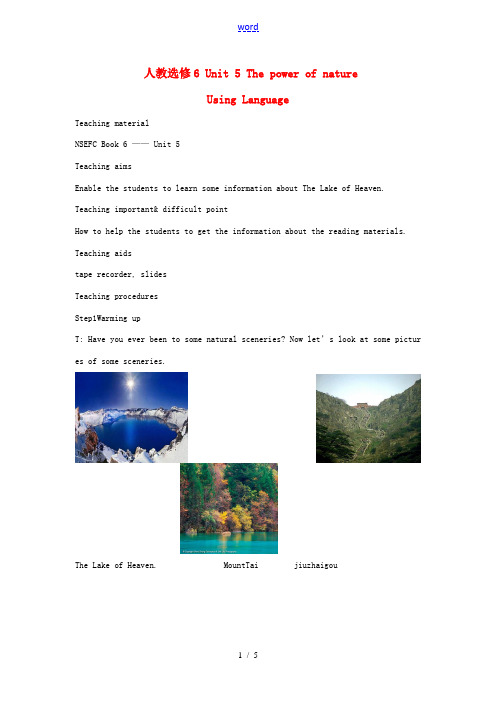
人教选修6 Unit 5 The power of natureUsing LanguageTeaching materialNSEFC Book 6 —— Unit 5Teaching aimsEnable the students to learn some information about The Lake of Heaven. Teaching important& difficult pointHow to help the students to get the information about the reading materials. Teaching aidstape recorder, slidesTeaching proceduresStep1Warming upT: Have you ever been to some natural sceneries? Now let’s look at some pictur es of some sceneries.The Lake of Heaven. MountTai jiuzhaigouMount Huang fuxianhu the west lake Step 2 Fast readingRead the text quickly and find out the key words(关键词) of each paragraph.Paragraph 1 ChangbaishanParagraph 2 TianchiParagraph 3 storiesParagraph 4 coinStep 3 Careful ReadingRead the passage carefully and finish the following tasks.Paragraph 1 ChangbaishanParagraph 2 TianchiParagraph 3 Fill in the blanks with some persons or animals to plete the chart. Three young womenbathingfrom heaven a birdflewThe ManchupeopledroppedfatherfruitA handsomegave birth toboyswallowedThe youngest girlpregnantParagraph 4coinYou and your ______ one drop a ____ into the clear, blue water to ________ your love will be as _____ and _______ as the lake.Keys: loved; coin; guarantee; deep; lastingStep 4 Detailed reading1. In what province is Changbaishan?In Jilin Province.2.What is a nature reserve? Why is Changbaishan a famous nature reserve?A place kept in its natural state for people to enjoy. The largest one in China.3.What is the most popular tourist attraction in the reserve?Tianchi, or the Lake of Heaven.4. What does Tianchi mean? How is Tianchi formed?The Lake of Heaven. In the crater of a dead volcano.5. What is the connection between the Manchu people and Tianchi?The story of the father of Manchu people.Step 5 DiscussionIf you were a tourist guide(导游), how would you introduce the Lake of Heaven in Changbaishan to the tourists?ChangbaishanTianchistorycoinThe Lake of Heavenin its four seasonsSpringsummerautumnwinterStep 6 HomeworkSurf the Internet to find more information about the Lake of Heaven.。
高中英语 Unit5《The power of nature》教案(3) 新人教版选修6
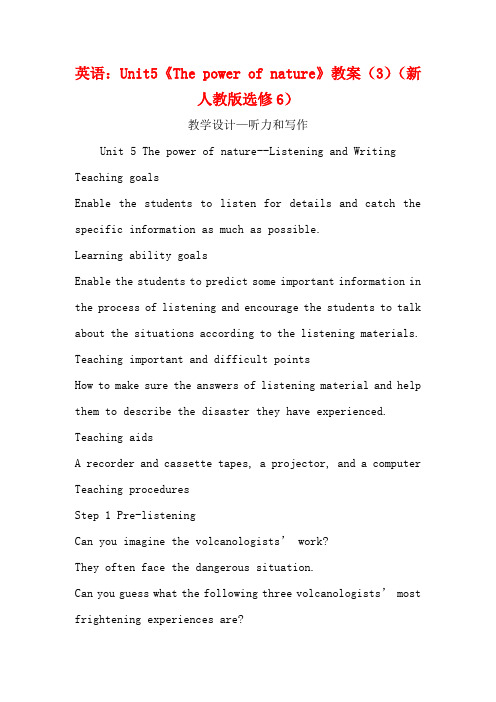
英语:Unit5《The power of nature》教案(3)(新人教版选修6)教学设计—听力和写作Unit 5 The power of nature--Listening and Writing Teaching goalsEnable the students to listen for details and catch the specific information as much as possible.Learning ability goalsEnable the students to predict some important information in the process of listening and encourage the students to talk about the situations according to the listening materials. Teaching important and difficult pointsHow to make sure the answers of listening material and help them to describe the disaster they have experienced. Teaching aidsA recorder and cassette tapes, a projector, and a computer Teaching proceduresStep 1 Pre-listeningCan you imagine the volcanologists’ work?They often face the dangerous situation.Can you guess what the following three volcanologists’ most frightening experiences are?Step 2 ListeningLook at the pictures of volcanologists at work on page 38. Then listen to them talking about their most frightening experience. Write their names under the picture.A. Frank GoreB. Jane SmallC. Sarah TangListen to the tape again, and answer the following questions.1. How long has she been a volcanologist?2. In what country was the volcano he/she talks about?3. Why did he/she forget to be frightened?Jane Small1.How long has she been a volcanologist?Five years.2. In what country was the volcano she talks about?Alaska3. Why did she forget to be frightened?She was excited about what she had done.Frank Gore1. How long has he been a volcanologist?Ten years.2. In what country was the volcano he talks about?Hawaii.3.Why did he forget to be frightened?The pilot had to fly low to get under the clouds.Sarah Tang1. How long has she been a volcanologist?Twenty years.2. In what country was the volcano she talks about?New Zealand.Why did she forget to be frightened?She felt the ground tremble.ListeningListen to the tape once more. Write the name of the person beside the things they said.1. I was so excited about what I had done and where I was,I forgot my fear.( )2. I was very worried that the volcano might erupt while I was still inside it.( )3. I was very relived when we finally reached our camp. ( )4. I was trembling almost as much as the ground under my feet.( )5. I was still terrified. ( )6. I was so nervous that my whole body was damp with sweat.( )7. I was so anxious that I couldn’t move for a long time.( )8.I had to force myself not ton panic. ( )9.Then I got up the courage to bend over the boiling lava. ( )Step 3 SpeakingThink of a powerful natural disaster (such as an earthquake, food, typhoon, storm) that you have experienced. You can use your imagination if you have not experienced any of these things. Tell your partner about your experience and how you felt.Writing1. Choose one of the natural disasters or any other disasteryou have experienced.2. Make a timeline to show the order in which the eventshappened. For example:10am left holiday house to walk in the mountains 12am saw dark clouds in the sky, started to go back12:30pm snowstorm started1:00pm we were completely lost… …3. Spend a few minutes on your own imagining your experiences and how you felt. Now imagine you are safely back home. Write a dairy entry about your experience.A possible version:Jane and I had been waking in the mountains when we noticed some dark clouds coming down the mountain. We decided to turn around and go home.As we walked the clouds got nearer and nearer and the day grew darker. Then all of a sudden it began to snow. It was soon snowing so hard we couldn’t see very far in front of us. H olding each others’ hands so we couldn’t get separated, we continued down the mountain. Butthe snow got deeper and deeper. Walking became harder and harder. We began to get very tired and very frightened.After a while the path became buried under the snow and we didn’t know which way to go. We were completely lost. We found some shelter behind a big rock. Hugging each other for warmth, we stayed like that until the storm was over. Luckily it only lasted an hour or two. Then the sun came out againand we could see our house in the distance. We were so relieved we both burst into tears.Step 4 HomeworkFinish your writing.。
人教版高中英语选修6教案Unit 5 The power of nature

人教版高中英语选修6教案Unit 5 Thepower of natureUnit5Thepowerofnature一、语言要点I单元要点预览(旨在让同学整体了解本单元要点)词汇部分词语辨析1.living/alive/live2.force/power/strength词形变化 1.volcanon.火山volcanicadj.火山的volcanologyn.火山学volcanologistn.火山学家 2.eruptv.爆发eruptionn.(火山,战争)爆发3.absoluteadj.绝对的,完全的absolutelyadv.绝对地4.anxiousadj.忧虑的anxietyn.担心,焦虑5.bathev.洗澡,游泳bathn.洗澡fortv.&n.安慰;使缓和comfortableadj.舒适的uncomfortableadj.不舒服的;不舒适的重点单词1.equipmentn.装备,设备2.appointvt.约定;任命,委任3.evaluatevt.评估,评价,估计4.preciousadj.贵重的,珍贵的5.panicv.惊慌n.惊慌,恐慌6.diverseadj.多种多样的,不同的7.guaranteevt.保证,担保重点词组compare……with与……比较burntotheground全部烧毁makeone’sway前往sparenoeffort不遗余力,尽力impresssb.withsth.使某人铭记某事重点句子1.Iwasabouttogobacktosleepwhensuddenlymybedroombeca measbrightasday.2.Itissaidthatthisboy,whohadagreatg iftforlanguagesandpersuasion,isthefatherofthemanchu people.重点语法动词形式ing作状语II词语辨析1).living/alive/liveadj.活的【解释】living可作定语又可作表语;可用于指人也可用于指物,指人时可表示“健在”此时指和”死”相对的活着。
人教版高中英语选修6教案Unit5Thepowerofnature
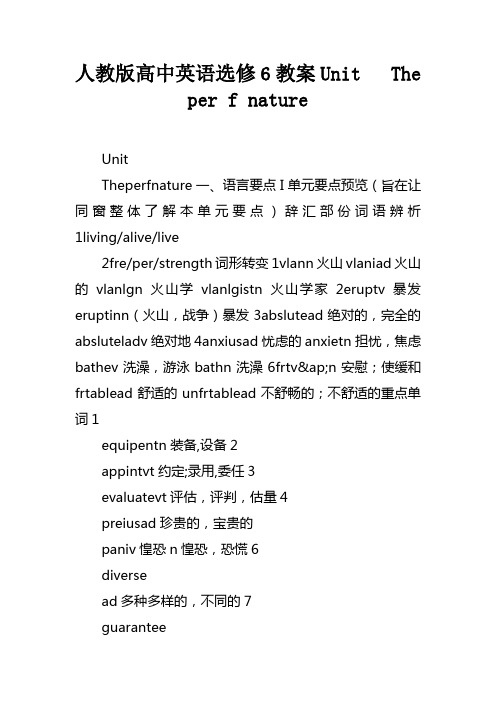
人教版高中英语选修6教案Unit Theper f natureUnitTheperfnature一、语言要点I单元要点预览(旨在让同窗整体了解本单元要点)辞汇部份词语辨析1living/alive/live2fre/per/strength词形转变1vlann火山vlaniad火山的vlanlgn火山学vlanlgistn火山学家2eruptv暴发eruptinn(火山,战争)暴发3abslutead绝对的,完全的absluteladv绝对地4anxiusad忧虑的anxietn担忧,焦虑bathev洗澡,游泳bathn洗澡6frtv≈n安慰;使缓和frtablead舒适的unfrtablead不舒畅的;不舒适的重点单词1equipentn装备,设备2appintvt约定;录用,委任3evaluatevt评估,评判,估量4preiusad珍贵的,宝贵的paniv惶恐n惶恐,恐慌6diversead多种多样的,不同的7guaranteevt保证,担保重点词组pare……ith与……比较burntthegrund全数烧毁aene’sa前去spareneffrt 不遗余力,尽力ipresssbithsth使某人铭刻某事重点句子1Iasabuttgbatsleephensuddenlbedrbeaeasbrightasda 2Itissaidthatthisb,hhadagreatgiftfrlanguagesandpersu asin,isthefatherftheanhupeple重点语法动词形式ing作状语II词语辨析1)living/alive/livead活的【说明】living可作定语又可作表语;可用于指人也可用于指物,指人时可表示“健在”现在指和”死”相对的活着。
alive可作表语,后置定语或补语。
多用于指人,往往指虽有死的可能,但目前仍是活着的,强调“活着的”本身。
live要紧用于指物,表示“活的、有生命的”,还能够表示“实况转播的”。
人教版高中英语选修6《Unit5Thepowerofnature》教案

人教版高中英语选修6《Unit5Thepowerofnature》教案人教版高中英语选修6《Unit 5 The power of nature》教案【一】教学准备教学目标1. Knowledge objectivesKnow that the -ing form can be used as various kinds of adverbialsUnderstand the differences among “doing”, “having done”, “being done” and “having been done”2. Ability objectivesMaster the usage of the -ing form as adverbials and properly use it in writingPolish one’s writing with the -ing form as adverbials3. Emotional objectivesCultivate teamwork and confidenceFeel free to use English grammar in daily life教学重难点教学重点 Understanding four -ing forms used as adverbials and five tips on how to use the -ing form as adverbials 教学难点 Master the usage of the -ing form as adverbials and properly use it in writing教学过程Lead-in: Song appreciation(1) Play the song T ake me to your heart before class.(2) Start the class with a clip of the song sung by the teacher.(3) Lead the Ss to notice the -ing form used as adverbials in the lyrics.This is a warming-up step designed to arouse Ss’ enthusiasm and to come to the point.Step 1: We ChooseTask 1: Observe the -ing form in each sentence and decide what it refers to.(reason, result, concession, time, manner, condition)1. Being very rich, he spends as much money as he likes. (reason)2. Working hard, you’ll surely succeed. (condition)3. They sat there, waiting for the beginning of the sports meeting. (manner)4. Walking on the street, he came across a long-lost friend. (time)5. The polar bear was not careful enough, falling on the icy ground. (result)6. Not understanding what you are talking about, I still admire you. (concession)It is intended to remind Ss that the -ing form can be used as various kinds of adverbials. Ask several Ss to answer and, if necessary, interpret the sentences for them with adverbial clauses.Task 2: Check the words in red and decide their relation with the subject and the predicate. (A. active B. passive C. meanwhile D. before-after)Laughing and jumping, he left school.Having finished his homework, he left school.Being talked about at that time, he left school.Having been punished, he left school.First, let Ss choose the correct relation between the -ing form and the subject and that between the -ing form and the predicate in each sentence. Then lead Ss to sum up the differences among “doing”, “having done”, “being done” and “having beendone”.Task 3: Read the sentences aloud and recall the tips.When the reading is finished, ask Ss how to use the -ing form as adverbials.It is intended as a transition from “what” to “how” and the second step is naturally introduced.Step 2: We ChangeTask 1: (Group work) Identify the mistakes in the following sentences and change the sentences into correct ones. Discuss your reason.1. I had a wonderful childhood, travel around the world.2. When crossed the road, you should be careful.3. Having not finished his homework, he was punished by his parents.4. Working hard, your dream will come true.It is aimed to revise the usage of the -ing form as adverbials. By group discussion, Ss may find it easier to solve the problem. Matters such as non-predicate, relation, conjunction, negative words and logical subject are all involved.Task 2: (Pair work) Orally change the adverbial clauses or compound sentences into the -ing form as adverbials.e.g. After we have been informed of Mr. Li’s birthday, we hurried to express our best wishes on the blackboard.(Notice that only the clause part will be changed: predicate→non-predicate)Having been informed of Mr. Li’s birthday, we hurried to……1. Because we hoped to convey our concern for him, we asked Miss Zhu to bring him a card.2. When we danced together, we felt very excited.3. Although we had not met him before, we still treated himas an old friend.4. If you think it over, you will have a good idea.5. She stood on the stage and played with her hair.6. He was so humorous that he made us burst into laughter.It is designed for Ss to put into practice the tips mentioned in the previous task.Step 3: We ChatTask 1: Using the correct form of the given verbs, help me to complete the caption of my moment.Last month, I led my students to join in the oral English competition.(live) far away from the site, we had to get up early in the morning. (not eat) anything before, I felt hungry. As for the students, though tired, they were still enthusiastic about the coming challenge, (talk and laugh) on the bus. When (arrive) at the site, they were very excited.(devote) to practicing before, they did a wonderful job in the competition, (bring) glory to our school. As far as I am concerned, (make) great efforts to practice, any of you can also stand out.It is a revision of the tips mentioned. In addition, it sets an example of how to use the -ing form as adverbials in our daily life.Task 2: Writingo Choose a picture to post.o Write the caption for it.o Try to use the -ing form as adverbials. (3 minutes)Ss are asked to choose a picture from five and write the caption for it by using the -ing form as adverbials in 3 minutes. This is to integrate what has been covered and put it into practice.Task 3: Sharingo Move around the classroom.o Share your moment.o Get “like” or “comment”.(You may also leave your comment when discovering any grammatical mistake.)An example is shown to clarify the instruction. Then Ss are given five minutes to share their moments with their classmates. This is a peer proof-reading activity.Task 4: Presentingo How many“ likes” have you got?o What about “comments”?o Who would like to share with the whole class your moment or the comments you got?This is for several volunteers to present their works and notice the common mistakes when using the -ing form as adverbials.Step 4: SummarySummarize what we have learnt today:o 6 kinds of adverbialso 4 forms of -ingo 5 tipsThis is to remind Ss of what they have learnt today.课后习题Homeworko Review the usage of the –ing form as adverbials.(You may refer to a mini-lecture. )o Polish your caption and share it with your friends.o Finish exercise 3 - 5 on Page 64 of your exercise book.The homework is intended to familiarize Ss with the rules of the -ing form used as adverbials and to develop their writingskills.人教版高中英语选修6《Unit 5 The power of nature》教案【二】教学准备教学目标教学目标:1 深入理解课文,分析文章长难句,培养快速阅读、整体理解和写作的能力。
Unit5Thepowerofnature(第五课时)教案(新人教选修六).doc
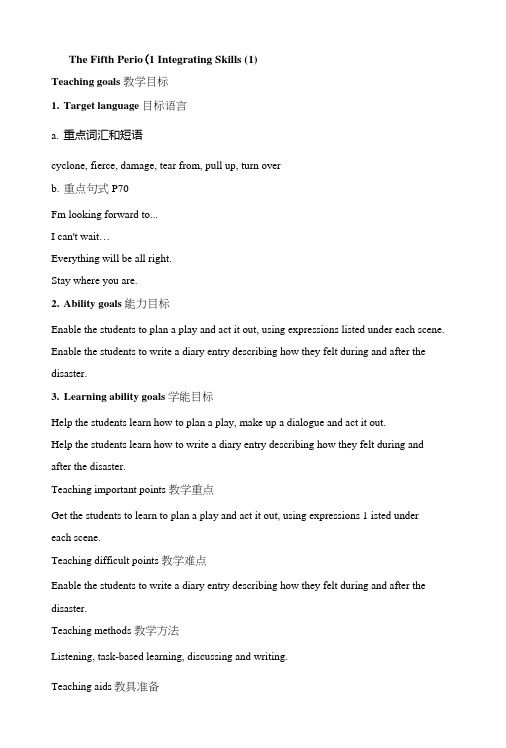
The Fifth Perio(1 Integrating Skills (1)Teaching goals 教学目标1.Target language 目标语言a.重点词汇和短语cyclone, fierce, damage, tear from, pull up, turn overb.重点句式P70Fm looking forward to...I can't wait…Everything will be all right.Stay where you are.2.Ability goals 能力目标Enable the students to plan a play and act it out, using expressions listed under each scene. Enable the students to write a diary entry describing how they felt during and after the disaster.3.Learning ability goals 学能目标Help the students learn how to plan a play, make up a dialogue and act it out.Help the students learn how to write a diary entry describing how they felt during and after the disaster.Teaching important points 教学重点Get the students to learn to plan a play and act it out, using expressions 1 isted under each scene.Teaching difficult points 教学难点Enable the students to write a diary entry describing how they felt during and after the disaster.Teaching methods 教学方法Listening, task-based learning, discussing and writing.Teaching aids教具准备A tape recorder and some pictures.Teaching procedures & ways 教学过程与方式Step I Talking (P69)T: Look at the picture on page 69, Talking. What happened to the house? Can you guess? SI: Maybe it was damaged in an earthquake.S2: Maybe a fierce cyclone happened in the area.T: You got it. The house was damaged by a cyclone. Have you experienced a cyclone before? Ss: No.T: How about typhoon, snowstorm or hailstorm? What are they like? You can choose one and describe it to your partners.Sample descriptions:HurricaneOne Friday, a hurricane struck the southeast of England. Between the midnight and 6:00 am the hurricane crossed the southeast corner of England with winds of up to 160 kph. It had been raining heavily for two days and the ground was very wet. Besides, it was autumn and the trees still had their leaves on. So the strong winds pushed over the trees easily. Fifteen million trees had been blown down by the strong wind. Power lines were brought down by fallen trees or branches. Electric and telephone services in some areas were cut down SnowstormOne night there was a heavy snowstorm, and in the morning people find their gardens were covered with thick snow. It's very difficult to walk in the street. Dustman had to clean the snow with forklift. Meanwhile, the early arrival of snow caused extensive damage to the trees. With the majority of trees yet to shed their leaves, the burden of the snow proved too heavy for many, and by Friday morning, the streets were littered with broken branches. HailstormIt was rare to see such a heavy hailstorm. A heavy downpour and table tennis-ball-sized hailstones attacked our town at 7:50 pm on Wednesd ay. On the street some big trees fell down in the hailstorm. Mr Wang stopped his car at the roadside to take shelter from the hailstorm, but the hailstorm almost broke the windows of his car. Farmers suffered a lot. Their corns and apple trees were destroyed completely.T: Excellent description. Look at the picture again. We know the house was destroyed by a fierce cyclone. It happened in Darwin, a city in the far north of Australia. Suppose we live in Darwin. What would you feel during the cyclone and after it was over?S3: I would be &lghtened by the strong wind and the huge noise it would make. I would stay in bed still and wait for the end of it. After it was over, I would be astonished by the big damages it had caused and feel helpless. How weak humans are before the natural forces!Step II Listening (P69)In this part, the students will listen to Christine talking about a cyclone she experienced. First get the students to read the seven sentences quickly and write 1-7 beside the events to show the order in which they happened. Then listen to check their answers. Listen to the tape for a second time to finish Exercise 2 on page 70.T: Now let's listen to Christine's description of a cyclone and see how she felt during and after the cyclone. The events have been listed but they are disordered. Read them quickly and write 1-7 beside the events to show the order in which they happened according to your own experience. Then we will listen to the tape and check your answers. Understand?Ss: YesThe students listen to check their answers. Then the teacher shows the correct answers.T: Where were the family members during the storm? Look at the floor plan on page 70. Write the names of the family members in the correct place on the floor plan. You can use a letter to stand for a family member when listening. Then rewrite their names after listening. LeTs begin. Are you ready?After listening, check their answers in class.Step in Writing (P74)T: Turn to page 74. We are going to practice writing a diary entry. Choose one of the natural disasters on the list or any other disaster you know about. Then imagine you were caught in this terrible natural disaster but you are safe now. Write a diary entry to explain how you felt during and after the disaster. First, make a timeline to show the order in which the events happen. You can follow the example. Now please choose a disaster and make atimeline.Ask the students to show their timelines before they write the dairy.A sample timeline: A hurricane4:00 pm Left home to go for a walk in the hills5: 00 pm Started to go back home, found the bridgehad been washed away by the floods, had tofind another way back5: 30 pm Started to wind6:00 pm Completely lost, had a rest to see where wewere6:30 pm Winds started to g. et strong, rained heavily7:00pm Found a cave, stayed in it till the rainstopped8:00 pm Returned to normal8:30 pm Went over the rocks and muddy road9: 30 pm Went home safelyT: OK! Now imagine you are safely back home after the disaste匸Write a diary entry about your experience and how you felt during it according to your timeline.A sample version:A HurricaneI am still terrified and a little excited. This afternoon my brother and I went to the hills to have a walk. It's too hot at home. We were walking and talking happily, when we feel cool wind blowing. "It's going to rain. Lets go home.” Jim said. "But we cannot get across the rive匚^ I said, pointing to the river. The bridge had been washed away by the floods. So we had to find another way back. We walked along the river, trying to find another way home. At that time, it started to wind. "Where are we? We are lost. I asked my brother anxiously. “Dorft worry. Be calm. Sit there to have a rest and I will climb up to the rock to see where we are. ” Jim comforted me. Then he climbed up to the rock. "I see the way.n he shouted happily. Unluckily, it began to rain and wind heavily. u We have to take shelterfrom the rain now.n Jim said, u After the rain stop we can leave here. There is a cave over there. I remember I have been there. ” We ran into the cave and collected some sticks to make a fire. It's for about an hour that we stayed in the cave. Everything returned to normal. We began to make our way home. The path was muddy and rocks were slippery. It took us a long time to go over the rocks and go home. My parents were about to look for us when we arrived home. They were anxious about us and believed we were lost. What exciting and adventurous experience!Step V HomeworkT: Please turn to page 75. In next period, we will make a classroom display about natural disasters. Read the instructions and do some preparations after class. Collect pictures and diagrams and look for information about:•what causes this kind of disaster;•actual events that happened in the past in China or the rest of the world;•how people helped the victims;•what is being done to prevent the disaster happening again or to lessen the damage.That's all for toda y. See you tomorrow.。
人教版高二英语选修6教案:Unit5+The+power+of+nature+period2.doc

石泉中学课时教案精美句子1、善思则能“从无字句处读书”。
读沙漠,读出了它坦荡豪放的胸怀;读太阳,读出了它普照万物的无私;读春雨,读出了它润物无声的柔情。
读大海,读出了它气势磅礴的豪情。
读石灰,读出了它粉身碎骨不变色的清白。
2、幸福幸福是“临行密密缝,意恐迟迟归”的牵挂;幸福是“春种一粒粟,秋收千颗子”的收获. 幸福是“采菊东篱下,悠然见南山”的闲适;幸福是“奇闻共欣赏,疑义相与析”的愉悦。
幸福是“随风潜入夜,润物细无声”的奉献;幸福是“夜来风雨声,花落知多少”的恬淡。
幸福是“零落成泥碾作尘,只有香如故”的圣洁。
幸福是“壮志饥餐胡虏肉,笑谈渴饮匈奴血”的豪壮。
幸福是“先天下之忧而忧,后天下之乐而乐”的胸怀。
幸福是“人生自古谁无死,留取丹心照汗青”的气节。
3、大自然的语言丰富多彩:从秋叶的飘零中,我们读出了季节的变换;从归雁的行列中,我读出了集体的力量;从冰雪的消融中,我们读出了春天的脚步;从穿石的滴水中,我们读出了坚持的可贵;从蜂蜜的浓香中,我们读出了勤劳的甜美。
4、成功与失败种子,如果害怕埋没,那它永远不能发芽。
鲜花,如果害怕凋谢,那它永远不能开放。
矿石,如果害怕焚烧(熔炉),那它永远不能成钢(炼成金子)。
蜡烛,如果害怕熄灭(燃烧),那它永远不能发光。
航船,如果害怕风浪,那它永远不能到达彼岸。
5、墙角的花,当你孤芳自赏时,天地便小了。
井底的蛙,当你自我欢唱时,视野便窄了。
笼中的鸟,当你安于供养时,自由便没了。
山中的石!当你背靠群峰时,意志就坚了。
水中的萍!当你随波逐流后,根基就没了。
空中的鸟!当你展翅蓝天中,宇宙就大了。
空中的雁!当你离开队伍时,危险就大了。
地下的煤!你燃烧自己后,贡献就大了6、朋友是什么?朋友是快乐日子里的一把吉它,尽情地为你弹奏生活的愉悦;朋友是忧伤日子里的一股春风,轻轻地为你拂去心中的愁云。
朋友是成功道路上的一位良师,热情的将你引向阳光的地带;朋友是失败苦闷中的一盏明灯,默默地为你驱赶心灵的阴霾。
人教版高中英语选修六《Unit 5 The power of nature》教学设计
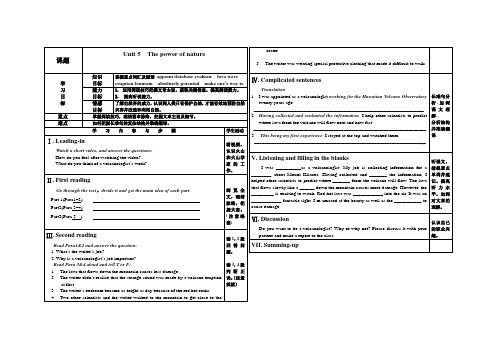
.Summing-up
Ⅷ.Homework
Please find outmoreadvantages anddisadvantages of volcanoesfrombooks or the Internet and then write a composition:
The Power ofVolca.Listening and filling in the blanks
I was__________as a volcanologist. Myjob is collecting information for a ________aboutMountKilauea. Having collected and _______the information, I helped other scientists to predict where _______from the volcano will flow.The lavathat flows slowly like a ______ down the mountain causes moredamage. However, the _________ is exciting to watch. Red hot lava was ____________ into the air. It was an ____________fantastic sight. I’m amazed at the beauty as well as the ___________to cause damage.
一分为二地看待事物,提高书面表达能力。
____________________________________________________________________
新课标人教版选修六Unit 5 The power of nature教案
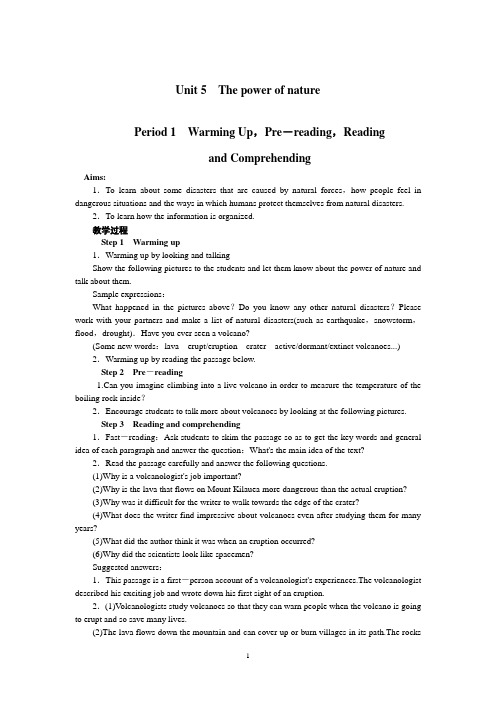
Unit 5The power of naturePeriod 1Warming Up,Pre-reading,Readingand ComprehendingAims:1.To learn about some disasters that are caused by natural forces,how people feel in dangerous situations and the ways in which humans protect themselves from natural disasters.2.To learn how the information is organized.教学过程Step 1Warming up1.Warming up by looking and talkingShow the following pictures to the students and let them know about the power of nature and talk about them.Sample expressions:What happened in the pictures above?Do you know any other natural disasters?Please work with your partners and make a list of natural disasters(such as earthquake,snowstorm,flood,drought).Have you ever seen a volcano?(Some new words:lava erupt/eruption crater active/dormant/extinct volcanoes...)2.Warming up by reading the passage below.Step 2Pre-reading1.Can you imagine climbing into a live volcano in order to measure the temperature of the boiling rock inside?2.Encourage students to talk more about volcanoes by looking at the following pictures.Step 3Reading and comprehending1.Fast-reading:Ask students to skim the passage so as to get the key words and general idea of each paragraph and answer the question:What's the main idea of the text?2.Read the passage carefully and answer the following questions.(1)Why is a volcanologist's job important?(2)Why is the lava that flows on Mount Kilauea more dangerous than the actual eruption?(3)Why was it difficult for the writer to walk towards the edge of the crater?(4)What does the writer find impressive about volcanoes even after studying them for many years?(5)What did the author think it was when an eruption occurred?(6)Why did the scientists look like spacemen?Suggested answers:1.This passage is a first-person account of a volcanologist's experiences.The volcanologist described his exciting job and wrote down his first sight of an eruption.2.(1)Volcanologists study volcanoes so that they can warn people when the volcano is going to erupt and so save many lives.(2)The lava flows down the mountain and can cover up or burn villages in its path.The rocks that erupt from the volcano usually don't damage anything because no one lives near the crater.(3)The author was wearing special protective clothing that made it difficult to walk.(4)The author finds their beauty and their potential to cause great damage very impressive.(5)He thought it was an earthquake.(6)Because they wore white protective suits that covered their whole body.3.Ask students to scan for detailed information and discuss the following question with their partners and be prepared to report to the class.Question:Having learned a little more about the work of a volcanologist,do you think it is an occupation you would enjoy?Give you reasons.Suggested answers:No,I probably wouldn't enjoy this job because I wouldn't have to live in other countries and I don't like being in dangerous situations,either.Above all,I'm not very good at science.ORYes,I'd love to do a job like this because I would enjoy working outside and I think I would enjoy the adventure.It would be exciting to meet people from different countries and I would feel good about helping people avoid danger.Step 4Language studyDealing with any language problem if any(words or sentences students might not understand)to help the students to have a better understanding of the text.Step 5Listening,reading aloud and underliningAsk students to read the passage aloud to the tape and let them pay attention to the pronunciation of each word and the pauses within each sentence.Tell them to pick out all the useful expressions or collocations from the passage while reading and copy them to the notebook after class as homework.Collocations:make one's way,a live volcano,be about to do,look down into,out of the way,be covered with,burn to the ground,attach...to...,compare...with...,run out of Step 6Structure analyzingAfter reading,ask students to discuss the text structure.Keys for reference:This passage is a first-person account of a volcanologist's experiences.The volcanologist described his exciting job and wrote down his first sight of an eruption.The first paragraph introduces the topic and the theme of the text.The rest of the text presents the information in chronological order.A feature of an account of a volcanologist's experiences is the abundance of time expressions.The last sentence of the report functions as a conclusion.In addition,each section begins with a topic sentence.Step 7RetellingAsk students to talk about the volcanologist's experiences in their own words.Give them some key words and expressions.Then let them try to retell the passage.Step 8Homework1.Learn the useful new words and expressions in this part by heart.2.Try to find more pictures showing natural forces and talk about them.Step 9Reflection after teachingPeriod 2Language Study (1)Aims:To get the students to learn to use the following important new words and phrases freely:absolutely,make one's way,alongside,appoint,wave,suit,potential,actual.教学过程Step 1Revision1.Check the homework exercises.2.Ask some students to say something about the power of nature.Step 2Reading and findingGet students to read through Warming Up,Pre-reading,Reading,Comprehending and Learning about Language to underline all the new words and useful expressions or collocations in these parts.Read them aloud and copy them down in the exercise book.Step 3Practice for useful words and expressions1.Turn to Page 36.Go through the exercises in Discovering useful words and expressions with students and make sure they know what to do.2.Give them several minutes to finish the exercises.They first do them individually,and then discuss and check them with their partners.3.Check the answers with the whole class and explain the problems they meet where necessary.Step 4Vocabulary study1.alongside(P34)【原句再现】I travel to unusual places and work alongside people from all over the world.我跑的地方是稀罕奇特的地方,和我一道工作的人来自世界各地。
人教版英语选修六Unit5 the power of nature(第一课时)教学教案
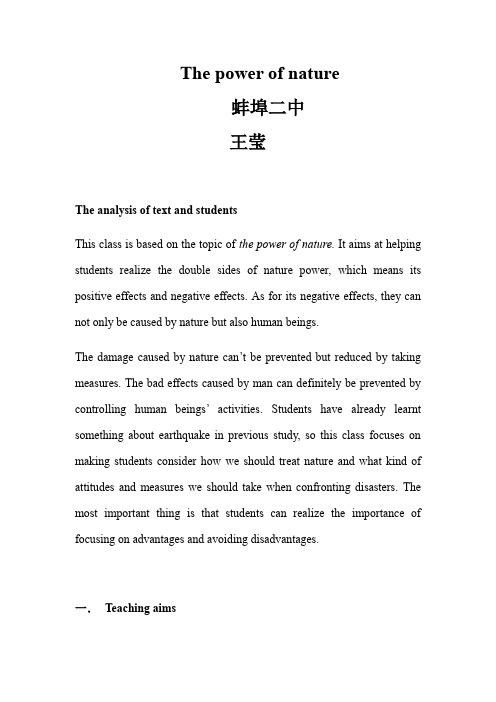
The power of nature蚌埠二中王莹The analysis of text and studentsThis class is based on the topic of the power of nature. It aims at helping students realize the double sides of nature power, which means its positive effects and negative effects. As for its negative effects, they can not only be caused by nature but also human beings.The damage caused by nature can’t be prevented but reduced by taking measures. The bad effects caused by man can definitely be prevented by controlling human beings’activities. Students have already learnt something about earthquake in previous study, so this class focuses on making students consider how we should treat nature and what kind of attitudes and measures we should take when confronting disasters. The most important thing is that students can realize the importance of focusing on advantages and avoiding disadvantages.一.Teaching aims1.Introduce the topic of “The power of nature” to students2.Students know the different forms and effects of nature power3.students realize that we should draw on the advantages of natureand avoid its disadvantages二.Teaching important and difficult points1.How to help the students realize the importance of the power ofnature, including using energy as well as protecting human beings from damage2.How to enable the students to take full advantage of the naturepower and meanwhile protect the nature三.Teaching method sDiscussion, speaking and cooperative learning四.Teaching aidsMultimedia facilities, photos五.Teaching proceduresⅠ. GreetingsGreet the whole class as usual.Ⅱ.Warming upBrainstorming:The teacher asks one question: What does the power of nature mean? Can you give some names of nature power?The students may give various answers, such as wind, water, sun, earthquake……Ⅲ. PresentationStep one: Show students some picturesPresent picturesPresent the pictures of water, coal, wildlife one by one… and then ask students the question: what can we use them to do? What will happen if they are treated in this way?Students’ answers may vary.Teacher: From these pictures, can you tell me what kinds of effects can nature power make?the power of nature : positive effects & negative effectsTeacher asks students another question: The bad effects are caused by ____?Possible answers: They are caused by man. They are man-made disasters.Step two: Show the pictures of natural disasterTeacher: Can we stop the earthquake?S: No.T: Can we do something to reduce the damage caused by earthquake? Then what can we do?Students answer may vary.After that, let’s think about what we can do to deal with natural disaster, man-made disaster and how should we treat the positive power.Step three: Show a formShow the form of “Advice/ Measures”Then show students a picture of saving energy.Ⅳ. ConclusionAsk students to consider the question:The power of nature can bring us both benefits and damage, so we should draw on advantages and avoid _________ (disadvantages)Ⅴ. ConsolidationPlay a gameOne group of students act one kind of natural disaster, ask other students to guess what it is. And then give more than one piece of advice.After that, show the students a song “the earth song”.Ⅵ. HomeworkAsk students to work together to make a blackboard newspaper based on the topic of the power of nature.Ⅶ. Blackboard DesignThe power of naturebenefits Groupdamage: 1 2 3 4 5 man- made & natural disasterTeaching Reflection。
高中英语Unit 5 The power of nature教案人教版选修六

Unit5 The power of natureI.单元教学目标(技能目标)◆talk about volcanoes and the work of volcanologists◆practice expressing fear and anxiety◆learn the –ing form used as adverbial in a sentence◆write about an experience in a nature disasterII.目标语言1.功能句式: expressing fear and anxiety.◆I was so excited about what I had done and where I was, I forgot my fear.◆I was very worried that…◆I was very relieved when…◆I was trembling almost as much as the ground under my feet.◆I was still terrified.◆I was so nervous that my whole body was damp with sweat.◆I was so anxious that I couldn’t move for a long time.◆I had to force myself not to panic.◆Then I got up the courage to …2.词汇四会词汇:volcano erupt eruption ash hurricane adventure bore excite evaluate unfortunate unfortunately fountain absolute absolutely fantastic crater potential impress precious novelist cancel effort relieve tremble sweat anxiety anxious panic courage typhoon heaven diverse diversity unique bathe swallow guarantee词组:pare …with burn to the ground make an effort make one’s way glance through vary from … to3. 语法:the –ing form used as adverbial in a sentenceLooking carefully at the ground,I made my way to the edge of the crater.Having experienced quite a few earthquakes in Hawaii already, I didn’t take much notice.Period1 Warming up and pre-readingTeaching goals:a.Encourage the students to discuss volcanoes.b.Enable the students to know more about volcanoesTeaching important and difficult points:Talk about volcanoes and the work of volcanologistsTeaching aids:A recorder, a projector, and a puterTeaching methods:Brainstorm and discussion (Group work).Teaching procedures and waysIn order to talk about whatvolcanoes are and how they are formed, students need to learnSome new words: lava erupt/eruption crater active/dormant/extinct volcanoes Step I Show some pictures of disastersAsk student to name disasters as much as they know.Sample answer: cyclone typhoonHurricanetornadosnowstormlandslideV olcanotsunami earthquakefloodhailstormsandstormStep II QuestionsAsk them what they feel when they see the power of nature showing in the pictures:Have you ever experienced one?Share you experience and feelings? (Were you frightened and how frightened were you?)Some expressions tips: scared to death frightened worriedunforgettable unbelievableHave you ever seen a volcano?Ask Ss to plete exercise 1 in groups. Then check their answers orally as awhole class.Ask students to help you make a list of words connected with volcanoesDiscuss with students where in the world active and extinct volcanoes occur.Step III Pre-reading1) Can you tell me who will climb into a livevolcano in order to take the temperature?of the boiling rock inside?volcanologists——do they take up a crazy job?2)get the students to answer the six questions in pre-reading to find out whetherthey willenjoy working as a volcanologist.Students could do this activity as a survey by asking others in their class these questionsOr they could do it individually.3)after they have pleted the task, survey the class to find out how many mightenjoythe work of a volcanologist.their guesses were.Afterthoughts:_____________________________________________________________________ _____________________________________________________________________ _____________________________________________________________________ ______________________________________________________________Period 2Reading and prehendingTeaching goals:a.Enable the students to master some English expressions and phrases and to know someknowledge of volcanoesb.Enable the students to master important pointsTeaching important points:Let Ss learn to use the structures of giving suggestionTeaching methods:Skimming method, Task-based methodTeaching aids:A projector, a tape-recorder and a blackboardTeaching procedures and ways:Step I First readingScanning & skimmingAsk students to read through the passage quickly to get a main idea ofthe whole passage. Give them a limited time to read the whole passagein order to encourage them to practice reading for general ideas and todiscourage them from reading word by wordmain idea: This passage is a first-person account of a volcanologist’s experiences.The volcanologist described his exciting job and wrote down his firstsight of an eruption.What does a volcanologist do ?( answer in the text )Then let students do the multiple-choices (见课件)Set Exercise 1 in“prehending〞either as a group or whole-class activity. Explain to students that the purpose of questions like these is to help themdevelop skills of evaluating a text.Step II Second readingBefore reading, glance through Exercise 2 on Page35.Choose some to ask them and check their answers:1. Why is a volcanologist’s job important?V olcanologists study volcanoes so that they can warn people when the volcano is going to erupt and so save many lives.2. Why is the lava that flows on MountKilauea more dangerous than the actual eruption?The lava flows down the mountain and can cover up or burn villages in its path. the rocks that erupt from the volcano usually don’t damage anything because no one lives the crater.3.Why was it difficult for the writer to walk towards the edge of the crater ?The author was wearing special protective clothing that made it difficultto walk4. What does the writer find impressive about volcanoes even after studying them for 20 years?The author is impressed by the beauty of the eruption and also by its potential to cause great destruction.Step III Third reading (Read again to find more details)1).what made the author realize that an eruption occurred ?answer: my bed began shakinga strange soundmy bedroom became as bright as dayan abosolutely fantastic sightred hot lava was fountaining hundredsof metres into the air2).what did the scientists do after the eruption ?answer: put on white protective suits, helmets, big bootsdropped as closed as possible to the craterslowly make our way to the edge of the craterlooked down into the red boiling centerStep IV HomeworkSpend some time researching one disaster. You can use books, magazines,newspapers or the Internet. Collect pictures and diagram and look for information about:•what causes this kind of disaster•actrual events that happened in the past in china and/or the rest of the world •how people helped the victims•what is being done to prevent the disarster happening again or to lessen the damageAfterthoughts:_____________________________________________________________________ _____________________________________________________________________ ___________________________________________________________________________________________________________________________________Period3-4 Language PointsTeaching Aims1.To learn some new words and phrases.2.To learn some plicated sentence patterns.Teaching Important PointHow to help the students to master the usage of some useful words,expressions and sentences.Teaching Difficult PointHow to enable the students to grasp and remember the detailed information of the reading material.Teaching ProcedureExplain language points in the reading passage.1. have you ever considered how weak humans are pared with a volcano,hurricane or earthquake ?你是否想过,和火山,飓风或地震相比人类是何等脆弱。
- 1、下载文档前请自行甄别文档内容的完整性,平台不提供额外的编辑、内容补充、找答案等附加服务。
- 2、"仅部分预览"的文档,不可在线预览部分如存在完整性等问题,可反馈申请退款(可完整预览的文档不适用该条件!)。
- 3、如文档侵犯您的权益,请联系客服反馈,我们会尽快为您处理(人工客服工作时间:9:00-18:30)。
Unit 5The power of naturePeriod 1Warming Up,Pre-reading,Readingand ComprehendingAims:1.To learn about some disasters that are caused by natural forces,how people feel in dangerous situations and the ways in which humans protect themselves from natural disasters.2.To learn how the information is organized.教学过程Step 1Warming up1.Warming up by looking and talkingShow the following pictures to the students and let them know about the power of nature and talk about them.Sample expressions:What happened in the pictures above?Do you know any other natural disasters?Please work with your partners and make a list of natural disasters(such as earthquake,snowstorm,flood,drought).Have you ever seen a volcano?(Some new words:lava erupt/eruption crater active/dormant/extinct volcanoes...)2.Warming up by reading the passage below.Step 2Pre-reading1.Can you imagine climbing into a live volcano in order to measure the temperature of the boiling rock inside?2.Encourage students to talk more about volcanoes by looking at the following pictures.Step 3Reading and comprehending1.Fast-reading:Ask students to skim the passage so as to get the key words and general idea of each paragraph and answer the question:What's the main idea of the text?2.Read the passage carefully and answer the following questions.(1)Why is a volcanologist's job important?(2)Why is the lava that flows on Mount Kilauea more dangerous than the actual eruption?(3)Why was it difficult for the writer to walk towards the edge of the crater?(4)What does the writer find impressive about volcanoes even after studying them for many years?(5)What did the author think it was when an eruption occurred?(6)Why did the scientists look like spacemen?Suggested answers:1.This passage is a first-person account of a volcanologist's experiences.The volcanologist described his exciting job and wrote down his first sight of an eruption.2.(1)V olcanologists study volcanoes so that they can warn people when the volcano is going to erupt and so save many lives.(2)The lava flows down the mountain and can cover up or burn villages in its path.The rocksthat erupt from the volcano usually don't damage anything because no one lives near the crater.(3)The author was wearing special protective clothing that made it difficult to walk.(4)The author finds their beauty and their potential to cause great damage very impressive.(5)He thought it was an earthquake.(6)Because they wore white protective suits that covered their whole body.3.Ask students to scan for detailed information and discuss the following question with their partners and be prepared to report to the class.Question:Having learned a little more about the work of a volcanologist,do you think it is an occupation you would enjoy?Give you reasons.Suggested answers:No,I probably wouldn't enjoy this job because I wouldn't have to live in other countries and I don't like being in dangerous situations,either.Above all,I'm not very good at science.ORY es,I'd love to do a job like this because I would enjoy working outside and I think I would enjoy the adventure.It would be exciting to meet people from different countries and I would feel good about helping people avoid danger.Step 4Language studyDealing with any language problem if any(words or sentences students might not understand)to help the students to have a better understanding of the text.Step 5Listening,reading aloud and underliningAsk students to read the passage aloud to the tape and let them pay attention to the pronunciation of each word and the pauses within each sentence.Tell them to pick out all the useful expressions or collocations from the passage while reading and copy them to the notebook after class as homework.Collocations:make one's way,a live volcano,be about to do,look down into,out of the way,be covered with,burn to the ground,attach...to...,compare...with...,run out of Step 6Structure analyzingAfter reading,ask students to discuss the text structure.Keys for reference:This passage is a first-person account of a volcanologist's experiences.The volcanologist described his exciting job and wrote down his first sight of an eruption.The first paragraph introduces the topic and the theme of the text.The rest of the text presents the information in chronological order.A feature of an account of a volcanologist's experiences is the abundance of time expressions.The last sentence of the report functions as a conclusion.In addition,each section begins with a topic sentence.Step 7RetellingAsk students to talk about the volcanologist's experiences in their own words.Give them some key words and expressions.Then let them try to retell the passage.Step 8Homework1.Learn the useful new words and expressions in this part by heart.2.Try to find more pictures showing natural forces and talk about them.Step 9Reflection after teachingPeriod 2Language Study (1)Aims:To get the students to learn to use the following important new words and phrases freely:absolutely,make one's way,alongside,appoint,wave,suit,potential,actual.教学过程Step 1Revision1.Check the homework exercises.2.Ask some students to say something about the power of nature.Step 2Reading and findingGet students to read through Warming Up,Pre-reading,Reading,Comprehending and Learning about Language to underline all the new words and useful expressions or collocations in these parts.Read them aloud and copy them down in the exercise book.Step 3Practice for useful words and expressions1.Turn to Page 36.Go through the exercises in Discovering useful words and expressions with students and make sure they know what to do.2.Give them several minutes to finish the exercises.They first do them individually,and then discuss and check them with their partners.3.Check the answers with the whole class and explain the problems they meet where necessary.Step 4Vocabulary study1.alongside(P34)【原句再现】I travel to unusual places and work alongside people from all over the world.我跑的地方是稀罕奇特的地方,和我一道工作的人来自世界各地。
